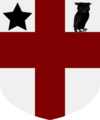Soltenia (Anteria): Difference between revisions
No edit summary |
No edit summary |
||
| Line 58: | Line 58: | ||
|ethnic_groups_year = 2015 | |ethnic_groups_year = 2015 | ||
|ethnic_groups_ref = Soltenish National Census Bureau | |ethnic_groups_ref = Soltenish National Census Bureau | ||
|religion = *60.1% Catholic <br> | |religion = *60.1% Catholic Christian<br> | ||
*12.3% Protestant <br> | *12.3% Protestant Christian <br> | ||
*11.1% Irreligious <br> | *11.1% Irreligious <br> | ||
*7.8% Culmian Paganism <br> | *7.8% Culmian Paganism <br> | ||
* | *3.25% Islam <br> | ||
*2.91% Jewish <br> | *2.91% Jewish <br> | ||
*1.1% Orthodox Christian <br> | |||
*1.4% Other | *1.4% Other | ||
|religion_year = 2015 | |religion_year = 2015 | ||
Revision as of 09:02, 3 June 2022
Soltenish Republic Repubblica Soltenitana | |
|---|---|
| Motto: Per Dio e la Patria For God and Country | |
| Anthem: Marzo Nazionale (National March) | |
| Capital | Carez |
| Largest | Ad Novas |
| Official languages | Soltenish |
| Recognised regional languages |
|
| Recognized Minority Languages |
|
| Ethnic groups (2015)Soltenish National Census Bureau |
|
| Religion (2015)Soltenish National Census Bureau |
|
| Demonym(s) | Soltenish |
| Government | Unitary Dominant Party Parliamentary Republic |
• President | Aurelio D'Libero |
• Secretary of the Senate | Cristoforo Giacomo |
• Chair of the High Court | Azelia Capo |
| Legislature | Senate |
| Formation | |
• Colonization by Canterians | Early 17th Century |
• Unification under Almaran Kingdom | 19 June 1692 |
• Soltenish Confederation Established | 4 July 1756 |
• New Year's Constitution | 1 January 1884 |
• Election of Ottavio Volpe | 23 June 1912 |
• Declaration of Victory | 11 March 1972 |
• First Free Elections | 29 June 1980 |
• Sovereignty dispute with Culmia | Ongoing |
| Population | |
• 2021 estimate | 147,069,420 (??) |
• 2015 census | Soltenish National Census Bureau |
| Currency | Bronzella (฿) (SBR) |
| Date format | dd/mm/yyyy and yyyy-mm-dd AD |
| Driving side | right |
| Calling code | +71 |
| Internet TLD | .as |
Soltenia, officially the Republic of Soltenia (Soltenish: Repubblica Soltenitana), is a sovereign nation located on a large island, off the Eastern coast of Merredone. The majority of the state’s territory is naturally defined by coastline, with the Republic bordering the Trident Union to the south and south east, Stivichia to the east, and Latvia to the north East. Soltenia's mainland population is estimated around 147 million citizens; amongst the most populous nations in Eastern hemisphere. The state’s capital is the coastal metropolis of Carez, with its own population estimated at approximately just over ten million permanent residents. The largest city is Ad Novas, which sits at the Novas River Delta and has a population of just over fourteen and a half million.
The majority of the nation is culturally and ethnically Soltenish Canterian - belonging to the eponymous linguistically distinct Canterian ethnogroup. The nation's mercantile history means that significant minorities of Vultic and Riamese populations exist, with multiple coastal cities having Vultic or Riamese speaking neighborhoods. Liberal immigration policies during the 1880s have also resulted in a large influx of Gassasinians. the geographic location of Soltenia has also left the state with a large Culmian indigenous minority and Tridentine immigrants. The total non-Soltenish population makes up just under thirty percent of the population at fourty four million.
A variety of regional languages exist but are mutually intelligible. A standard form of Soltenish, called "Standard Soltenish", based off of literary Almaran from the mid nineteenth century, exists and is the lingua franca of the state and government. Though most of the population is able to speak and understand Standard Soltenish, several groups, particularly minority groups, speak one of the several recognized minority languages. While the greater Soltenish state will not use a recognized minority language, local authorities will. Notably, Culmian is not recognized in any capacity by the Soltenish government.
The nation is renowned for the rugged natural beauty of its interior and its coastal towns and cities in particular are amongst the most visited tourist destinations in Merredone. Destinations such as the Riamese district of Queenstown, located in Ad Novas, or the Wur Kaneid Waterfalls attract thousands of tourists every year. The nation's mixed model economy is dominated by the extraction of its vast reserves of natural gas, precious metals, and expanding industrial and service sectors; both of which contain considerable government shares.
Though the nation has been praised since its nominal transition to democracy, Soltenia still lags behind many of its peers on the Human Development index, with experts rating the Republic at 0.69 to 0.71. Other issues that have impeded progress have been identified as military pervasiveness in the democratic system, governmental and industrial corruption, overpopulation, strained public and health care services, national debt and a considerable wealth divide. Additionally, terrorism as a part of the Culmian conflict has resulted in political changes and public safety measures that have been criticized as leading to democratic backsliding. Aurelio D'Libero, the Republic's president, has been particularly controversial in his consolidation of power.
The nation is currently lobbying for Association status within the Saltstil Pact.
Soltenia has been criticized for its intervention in the Culmian Dispute. Soltenia claims to have intervened to protect Sulman (a dialect of Soltenish) speaking minorities in the region, but critics claim that Soltenia merely used these minority groups as an excuse to seize and control territory in the region.

